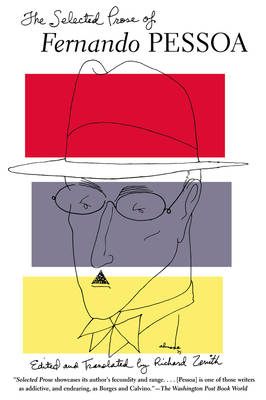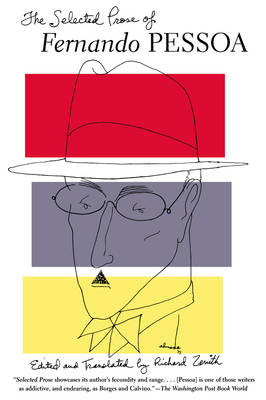
Bedankt voor het vertrouwen het afgelopen jaar! Om jou te bedanken bieden we GRATIS verzending (in België) aan op alles gedurende de hele maand januari.
- Afhalen na 1 uur in een winkel met voorraad
- In januari gratis thuislevering in België
- Ruim aanbod met 7 miljoen producten
Bedankt voor het vertrouwen het afgelopen jaar! Om jou te bedanken bieden we GRATIS verzending (in België) aan op alles gedurende de hele maand januari.
- Afhalen na 1 uur in een winkel met voorraad
- In januari gratis thuislevering in België
- Ruim aanbod met 7 miljoen producten
Zoeken
Omschrijving
A Washington Post and Los Angeles Times Best Book of the YearThough known primarily as a poet, Fernando Pessoa, a writer of "remarkable genius" (Washington Post) wrote prose widely, in several languages and in every genre. Now newly expanded and revised by award-winning translator and Pessoa biographer Richard Zenith, The Selected Prose of Fernando Pessoa spans fiction and drama, playful intellectual inquiry, Platonic dialogue, and bitter intellectual scrapping between Pessoa and his many literary alter egos ("heteronyms"). In these pieces, the heteronyms launch movements and write manifestos, and one of them attempts to break up Pessoa's only known romantic relationship. Also included is a generous selection from Pessoa's masterpiece The Book of Disquiet. This is an important record of a crucial part of the literary canon."A modern master to rank alongside Joyce, Kafka, Beckett."--Sunday Times (UK)"Beautifully translated, compact while appropriately diverse." --Los Angeles Times" [A] delightful collection . . . [Pessoa] is the modernist's modernist: an inspired amalgam of Lewis Carroll, Aristophanes, Erasmus, Voltaire." --Washington Times
Specificaties
Betrokkenen
- Auteur(s):
- Vertaler(s):
- Uitgeverij:
Inhoud
- Aantal bladzijden:
- 400
- Taal:
- Engels
Eigenschappen
- Productcode (EAN):
- 9780802159151
- Verschijningsdatum:
- 15/03/2022
- Uitvoering:
- Paperback
- Formaat:
- Trade paperback (VS)
- Afmetingen:
- 140 mm x 203 mm
- Gewicht:
- 362 g

Alleen bij Standaard Boekhandel
+ 47 punten op je klantenkaart van Standaard Boekhandel
Beoordelingen
We publiceren alleen reviews die voldoen aan de voorwaarden voor reviews. Bekijk onze voorwaarden voor reviews.









